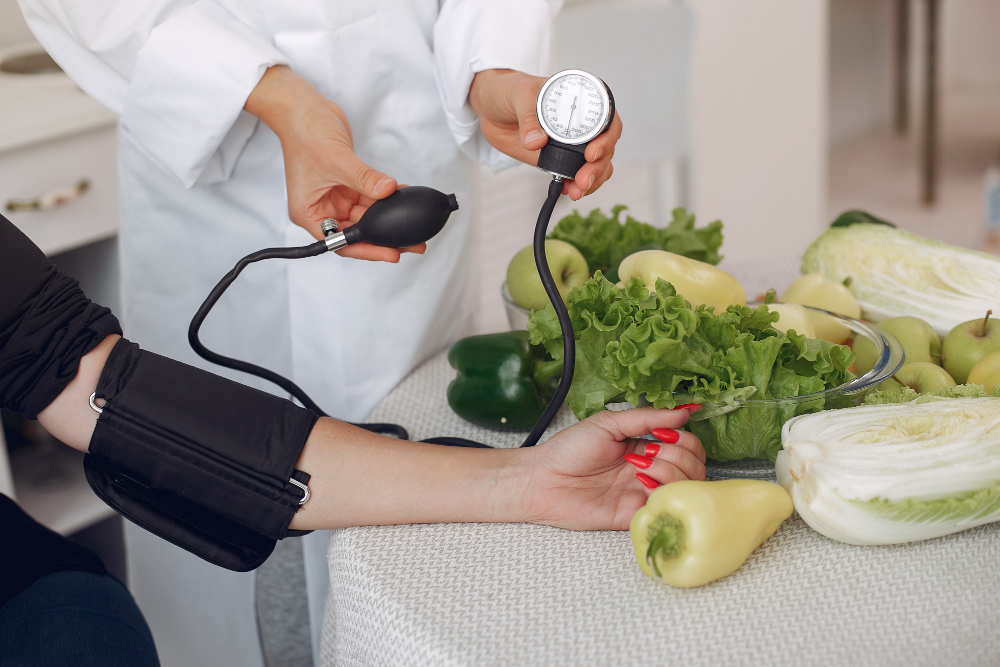Subtotal: ₹499.00

DASH diet to manage Hypertension
The DASH (dietary approaches to stop hypertension) diet is a dietary plan designed to reduce high blood pressure and improve overall cardiovascular health. The DASH diet emphasizes eating foods rich in fiber and low in saturated fat and salt. It aims to increase potassium, magnesium, calcium and fiber, while decreasing saturated fat. The DASH diet is recommended for people with high blood pressure or are at risk of developing high blood pressure. It encourages to eat :
- More fruits, vegetables and low fat dairy products if needed.
- More whole grain foods, protein and fiber.
- Healthy fat such as cold pressed or filtered oils, fish and nuts
- Limit sodium, sweets, sugary drinks, processed foods and red meat.
Here are some key features of DASH diet :
- Eat more fruits and vegetables
- The DASH diet recommends consuming 4-5 servings of fruits and vegetables per day, as they are rich in potassium, magnesium and fiber, which can help lower blood pressure.
- Choose whole grains
- Whole grains can be beneficial for people with hypertension because they are a good source of dietary fiber, magnesium and other nutrients that can help lower blood pressure.
- Replacing refined grains with whole grains like brown rice, quinoa, whole wheat, oats is recommended and in controlled portion sizes.
- Consume lean protein
- The DASH diet recommends incorporating lean protein sources to manage hypertension.
- Lean protein sources are lower in saturated fat and cholesterol than other protein sources, making them a healthier choice.
- 2 or less daily servings of lean protein sources like fish, skinless chicken, turkey, lentils, legumes etc. can be incorporated into a range of dishes.
- Incorporate healthy fat and oils
- The DASH diet encourages consuming healthy fat such as avocados, nuts, seeds, olive oil, flaxseed oil etc. which can help reduce inflammation, improve heart health and help lower blood pressure.
- Including nuts and seeds in moderation on a daily basis is encouraged.
- Restrict sodium intake
- High sodium intake is associated with an increased risk of high blood pressure, which can increase the risk of heart disease, stroke and other heart problems.
- The DASH diet limits sodium intake to 2,300mg per day or less, which can help reduce blood pressure.
- It’s important to note that the body needs a certain amount of sodium to function properly, so it is important not to eliminate it completely. However, reducing sodium intake to within the recommended level can help improve overall health and reduce the risk of hypertension.
HEALTH BENEFITS OF DASH DIET
- Lowers blood pressure – The DASH diet is effective in lowering blood pressure as it is rich in nutrients like potassium, magnesium, calcium and fiber.
- Reduces risk of heart disease – The DASH diet can help reduce the risk of heart disease by improving overall cardiovascular health. It does this by emphasizing heart-healthy foods like fruits, vegetables, whole grains, and lean protein while limiting saturated and trans fat, cholesterol, and sodium.
- Helps manage diabetes – The DASH diet may help improve blood sugar level by promoting a balanced and nutrient-rich diet that includes high fiber, low glycemic index foods.
- Promotes weight loss – The DASH diet is a balanced and flexible eating plan that can help promote weight loss by encouraging healthy food choices and portion control.
- Improves overall health – The DASH diet is associated with improved overall health due to its emphasis on whole, nutrient-dense foods that provide a range of vitamins, minerals, and antioxidants.
Along with these nutrition concepts, it is also important to exercise regularly, get quality sleep and manage stress better to regulate blood pressure and to keep it within the range.

Dietitian




